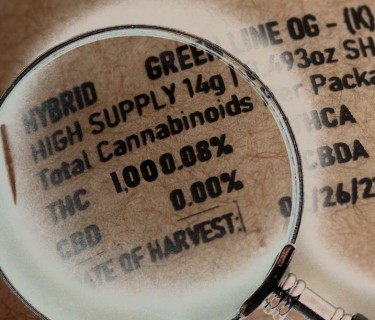
A class action lawsuit was filed by Dovel & Luner, a boutique litigation law firm, on behalf of Californians who bought cannabis products with false THC content labels against Cypress Manufacturing Company, and Lowell Farms Inc. The claim in the case is that the defendants, who produce, promote, sell, and distribute cannabis products under the “Lowell Herb Co.” brand, overcharged customers by selling them goods whose THC concentration was falsely advertised as being significantly higher than it was.
The lawsuit, filed in the State Supreme court of the State of California County of Los Angeles, claims that Cypress Manufacturing Company and Lowell Farms, violated a number of California consumer protection statutes, including the state’s rules on unfair competition and false advertising. Lowell Farms advertises mainly on Herb.co, no word yet if their main advertiser, or their CEO Matt Gray, will face an “aiding and abetting lawsuit” for fraud in a similar fashion as Mark Zuckerberg of Facebook was justed sued in Europe for the Juicy Fields fiasco.
According to the lawsuit, “Most of the psychological impacts that cannabis induces are caused by THC, hence customers prefer and seek out cannabis products with a higher level of THC. The main factor influencing demand for cannabis products is their THC content. As a result, cannabis items with higher THC concentrations are markedly more expensive to buy.
According to the lawsuit, goods with increased THC concentration command higher prices, which makes sense given that the more active ingredients there are, the more strong and more satisfying the high will be. But according to the lawsuit, it is problematic. The practice of purposefully declaring a high THC content on labels, known as “THC inflation,” has unfortunately resulted from the desire for high-THC goods.
According to California law, the THC content on the label must match the amount that is really in the product by a specific margin of error. In particular, the THC “claimed to be represented on a label” must be accurate to the THC concentration of the product to “plus or minus 10.0%.”
THE ALLEGED OFFENCE/MISDEED
According to Independent lab testing of Lowell Products, it is shown that the actual THC concentration of the products is considerably lower (far below the permitted 10% margin for error) than what was stated on the label. The Relaxing Indica Hash Infused 3-Pack Preroll from Lowell Smokes, in particular, had a label that stated it contained 38% THC. However, according to independent lab testing, the product really contained between 18 and 21% THC, which is significantly less than what was first reported. Accordingly, the THC concentration was overestimated by 81–111%, which is significantly greater than the 10% margin for error permitted by California standards.
The Department of Cannabis Control of California oversees marijuana businesses in the state. The organization offers dispensary permits and decides what labels a business can use for products. So the Department would have to look into this company and its products to give a verdict.
A PREVIOUS CALIFORNIA COMPANY SUED FOR MISLABELLING
Two local customers who claim that a California cannabis company lied about the effectiveness of its products filed a lawsuit against the corporation.
Two months ago, Blake Wilson of Fresno and Jasper Centeno of Long Beach filed a lawsuit against DreamFields Brands in state court. The lawsuit included claims of unjust enrichment, deliberate misrepresentations, and false advertising against DreamFields Brands.
The amount of Tetrahydrocannabinol, or THC, in the Jeeter pre-roll goods made by DreamFields, was also a factor in the case.
The pre-rolls do not contain a higher concentration of THC than the average product, according to a claim made by Centeno and Wilson’s attorneys. DreamFields advertises its products as possessing higher than the average quantities of THC. A Jeeter product that was advertised as having 46% THC content was later discovered to have somewhere around 23% and 27%, according to the lawsuit.
In a statement, plaintiffs’ attorney Christin Cho argued that consumers are willing to spend more for cannabis products with more THC and anticipate paying less for marijuana products with lower THC levels.
The lawsuit also makes reference to a marijuana review done by Weed Week in which staff members had a variety of marijuana products’ THC contents independently analyzed. All Jeeter products were discovered to have THC levels that were less than those listed on the labels after testing. In order to justify charging customers more, the complaint alleges that DreamFields inflated the THC content of its products.
In the filing, Centeno and Wilson claimed they were overcharged and paid a “high price” for Jeeter products. There is no mention of the men’s purchase prices for the cannabis items in the lawsuit, which is requesting class-action status. The couple is claiming hidden financial damages in their lawsuit.
The Golden State, which has the nation’s most enduring legal marijuana legislation, is home to a multibillion-dollar cannabis industry. The Annual Marijuana Business Factbook reports that California sold the most marijuana in the US last year ($5.7 billion).
CANNABIS BUSINESSES AND LAWSUITS
This action, which concerns deceptive advertising in the marijuana industry, looks to be the first in a line of claims brought by Dovel & Luner. A complaint was recently made against VO Leasing Corp. and its Presidential brand, as well as against Ironworks Collective Inc. and Stiiizy LLC.
Despite not being the target of Dovel & Luner, cannabis companies have lately been sued:
In a recent federal class action lawsuit, Trulieve was accused of firing staff members without cause or prior notice.
Vertical Bliss was ordered to pay $128 million to the state of California for the illegal manufacturing of millions of cannabis-infused candies as a result of a Los Angeles judge’s ruling.
In one of many class-action lawsuits resulting from the blending of two very different CBD and THC products, Curaleaf was ordered to pay $100,000 as part of the settlement in which approximately 500 people will be receiving 150 dollars to 200 dollars, dependent on the number of consumers who file a claim.
A lawsuit has been brought by the US Securities and Exchange Commission against C3 International Cannabis Co.
BOTTOM LINE
The cannabis industry in the United States of America is a rapidly developing and successful industry with cannabis on the brink of federal legalization. People can now legally get top-quality cannabis from dispensaries where available. Some cannabis companies seeking to make an extra profit are facing lawsuits for mislabelling their products giving them higher value since consumers will pay more for a higher level of potency.
INFLATED THC CLAIMS LEAD TO LAWSUITS, READ ON…
CAN YOU SEE OVER FALSE THC LEVELS? CONSUMERS FILED WEED LAWSUIT!
- SEO Powered Content & PR Distribution. Get Amplified Today.
- Platoblockchain. Web3 Metaverse Intelligence. Knowledge Amplified. Access Here.
- Source: http://cannabis.net/blog/news/inflating-the-thc-percentages-in-your-weed-to-get-more-sales-consumer-fraud-lawsuits-hit-the-ca




